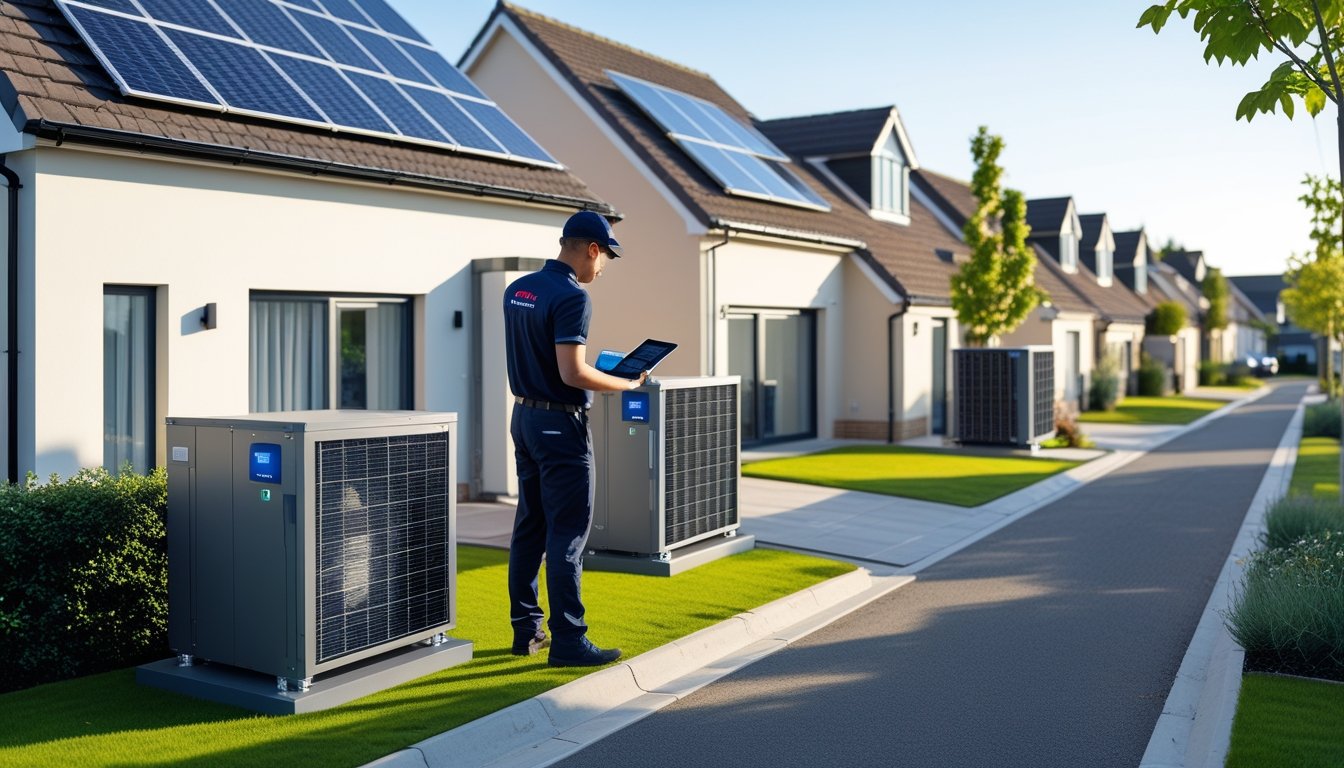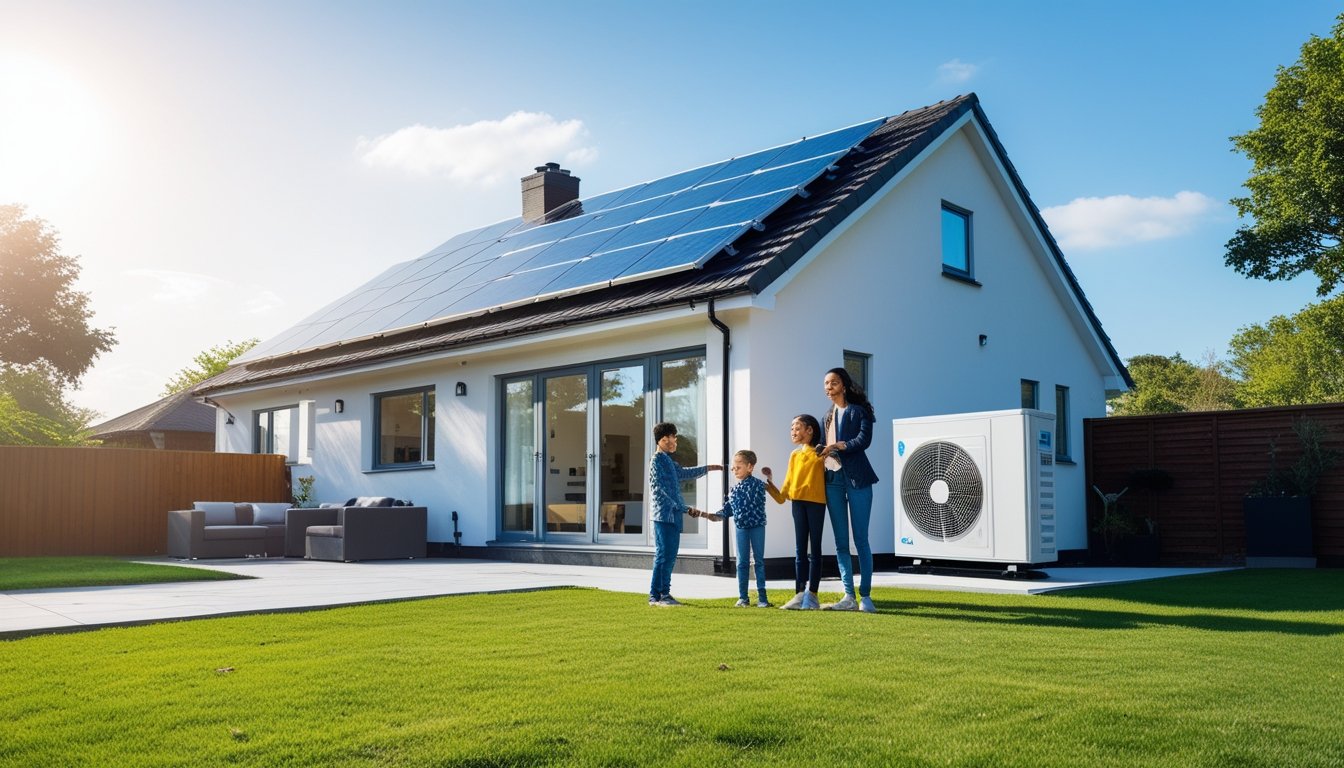Late updated: 05 Oct 2025 14:10
Written by: Oliver Bennett
Exploring Renewable Heating Innovations in UK Homes: A Modern Approach
The way we heat our homes in the UK is rapidly evolving, driven by the need for sustainable and efficient energy solutions. Homeowners are increasingly turning to renewable heating innovations to reduce carbon footprints and decrease energy bills. From hybrid systems that combine traditional boilers with renewable technologies to cutting-edge solutions like hydrogen boilers and advanced heat pumps, the options are becoming plentiful and accessible.

Our exploration into these technologies not only uncovers the impressive potential they hold for environmental impact reduction but also illuminates how these innovations can deliver reliable, cost-effective comfort. The government's encouragement of clean energy initiatives further supports the transition towards a future where homes harness advanced renewable heating solutions tailored to meet both practical needs and environmental goals.
Key Takeaways
- Renewable heating reduces carbon footprints and cuts energy bills.
- Advanced solutions offer reliable, cost-effective comfort.
- Government initiatives support renewable heating adoption.
Core Innovations in Renewable Heating for UK Homes
In recent years, we've seen significant advancements in renewable heating technologies aimed at making UK homes more energy efficient. These innovations not only help reduce greenhouse gas emissions but also provide us with sustainable alternatives to traditional heating methods such as gas boilers.
Heat Pump Technologies: Air Source and Ground Source
Heat pumps are a cornerstone in the renewable heating landscape. Air Source Heat Pumps (ASHPs) draw heat from the air and can efficiently provide warmth even in cooler temperatures. They are easier to install compared to their ground-source counterparts and are less intrusive, making them popular in urban settings where space is limited.
Ground Source Heat Pumps (GSHPs), on the other hand, extract heat from the ground. Although they require a larger initial investment and more space for underground pipes, they offer greater efficiency and can lower energy bills significantly over time. These systems are most effective in homes with larger outdoor spaces.
Both ASHPs and GSHPs are critical for reducing our reliance on fossil fuels. By integrating these efficient systems, we can make substantial progress towards achieving the UK's carbon reduction targets.
Mechanical Ventilation with Heat Recovery (MVHR)
Mechanical Ventilation with Heat Recovery (MVHR) systems provide a balanced approach to heating and ventilation. They work by extracting warm air from kitchens and bathrooms, recovering the heat, and using it to warm incoming fresh air. This process not only aids in heat retention but also improves indoor air quality, an often overlooked aspect of home heating.
MVHR is particularly beneficial in modern, airtight homes where natural ventilation might be limited. These systems can be tailored to the specific needs of a property, ensuring optimal air quality without compromising on energy efficiency. By incorporating MVHR, we can significantly reduce the energy required for heating and ventilation, further minimising our environmental impact.
Biomass Boilers and Low-Carbon Alternatives
Biomass boilers offer a renewable alternative to traditional gas boilers. These systems utilise organic materials such as wood pellets or chips as fuel. While biomass boilers do emit carbon dioxide, the carbon is generally offset by the amount absorbed during the growth of the biomass, making them a low-carbon option.
Biomass systems are versatile, suitable for both rural and urban settings, though they require adequate storage space for fuel. As part of a holistic approach to renewable heating, they can complement other technologies like heat pumps.
Embracing biomass boilers, alongside other advancements in heating technology, moves us towards a more sustainable and environmentally friendly future.
Maximising Energy Efficiency and Support for Adoption

To enhance the energy performance of UK homes, focusing on key areas such as building insulation, underfloor heating, and leveraging financial support plays a critical role. These elements are instrumental in elevating energy efficiency standards and making the adoption of renewable heating technologies more feasible for homeowners.
Building Insulation and Thermal Envelope Improvements
Insulation is a cornerstone of energy-efficient homes. By enhancing the thermal envelope, we significantly reduce heat loss, which is crucial in achieving net-zero targets. Insulating walls, roofs, and floors ensures that heat generated within a home stays inside longer, reducing the need for constant heating.
Modern materials and techniques, such as spray foam insulation and advanced thermal paints, further boost efficiency. Retrofitting older homes with high-performance insulation materials can lead to immediate and substantial energy savings. Comprehensive improvements in insulation are critical to meeting energy performance standards, providing a foundation for other energy-saving measures.
Integrating Underfloor Heating and Smart Control Systems
Underfloor heating offers an efficient way to keep homes warm, distributing heat evenly across rooms. This method works well with low-temperature heat sources, such as heat pumps. By lowering energy consumption while maintaining comfort, underfloor heating systems support our energy-saving goals.
Paired with smart control systems, these installations become even more effective. Smart thermostats and zone-based systems allow users to adjust their heating according to their schedules and preferences. This optimises energy use, ensuring heating is provided only when necessary, contributing to substantial savings on energy bills.
Financial Incentives and Government Grants
Financial incentives and government grants are pivotal in promoting the adoption of renewable heating. The UK Government's Green Homes Grant is a prime example, offering funding for energy efficiency upgrades, including insulation and renewable heating technologies. Such incentives reduce the initial cost burden on homeowners.
These grants facilitate the move towards cleaner heating solutions by making them financially accessible. By bridging the cost gap, these initiatives encourage homeowners to invest in energy-efficient technologies and thus support their long-term energy savings and carbon reduction goals.
Incorporating comprehensive schemes and making homeowners aware of potential financial aids ensures a smoother transition towards sustainable heating solutions, making energy efficiency a viable option for everyone.
Frequently Asked Questions

Exploring renewable heating innovations opens up a range of potential solutions for UK homes. By looking at different types of systems and recent technological advancements, we can better understand our options and the associated benefits and incentives.
What are the leading types of renewable heating systems currently installed in UK homes?
Air source heat pumps, ground source heat pumps, and biomass boilers are at the forefront of renewable heating in the UK. Solar water heating systems also contribute significantly by reducing dependency on traditional energy sources.
How do ground source heat pumps work and what are their benefits for UK homeowners?
Ground source heat pumps extract heat from the ground using pipes buried underground. This heat is transferred into our homes for heating and hot water. They are incredibly efficient even in colder temperatures, providing substantial energy savings and reducing environmental impact.
What incentives are available for UK residents looking to install renewable heating in their properties?
In the UK, residents may be eligible for financial incentives such as the Domestic Renewable Heat Incentive (RHI) which supports the adoption of renewable heating solutions by providing payments for producing heat in an environmentally friendly way.
What are the latest advancements in solar thermal technology for domestic heating?
Recent advancements in solar thermal technology involve more efficient solar collectors and improved storage solutions. These innovations enhance the capability to capture and store solar energy, thereby making solar thermal systems a more viable option for domestic heating throughout the year.
How can UK homeowners assess the suitability of their homes for renewable heating systems?
We can assess our homes for renewable heating by considering factors such as insulation standards, available space for equipment, and local climate conditions. Professional evaluations can provide tailored advice on the optimal systems for specific properties.
What role does underfloor heating play in enhancing the efficiency of renewable heating solutions?
Underfloor heating systems complement renewable heating technologies by providing even heat distribution and improving overall system efficiency. They work excellently with heat pumps, maximising the benefits of low-temperature heat produced by renewable systems.
